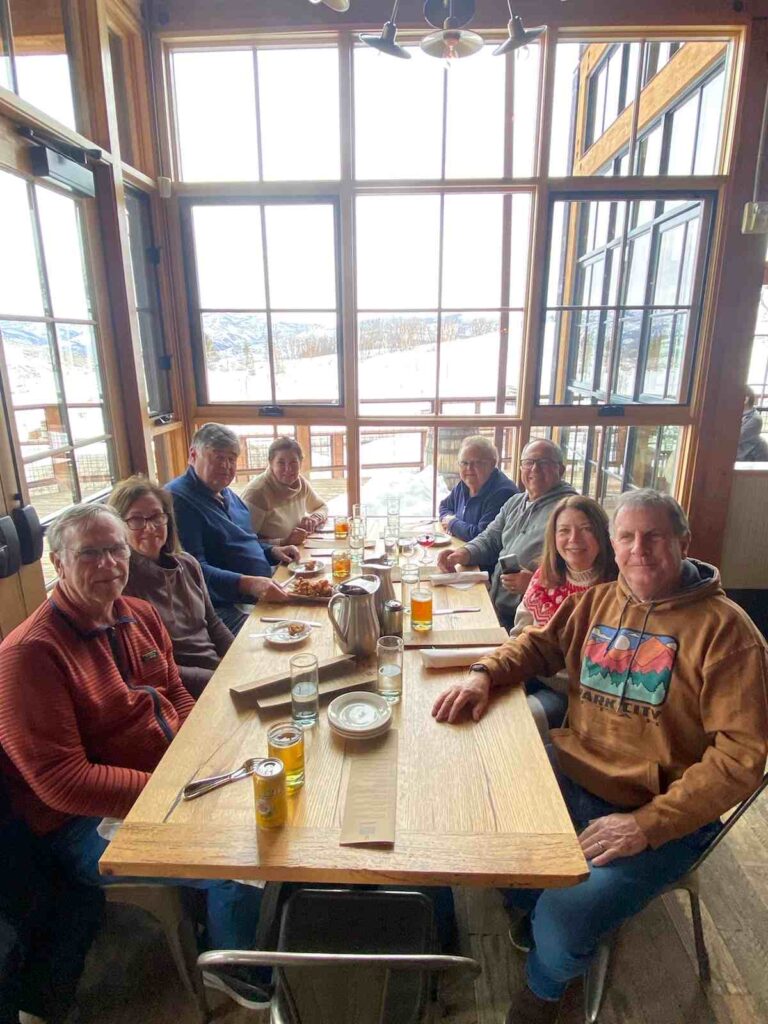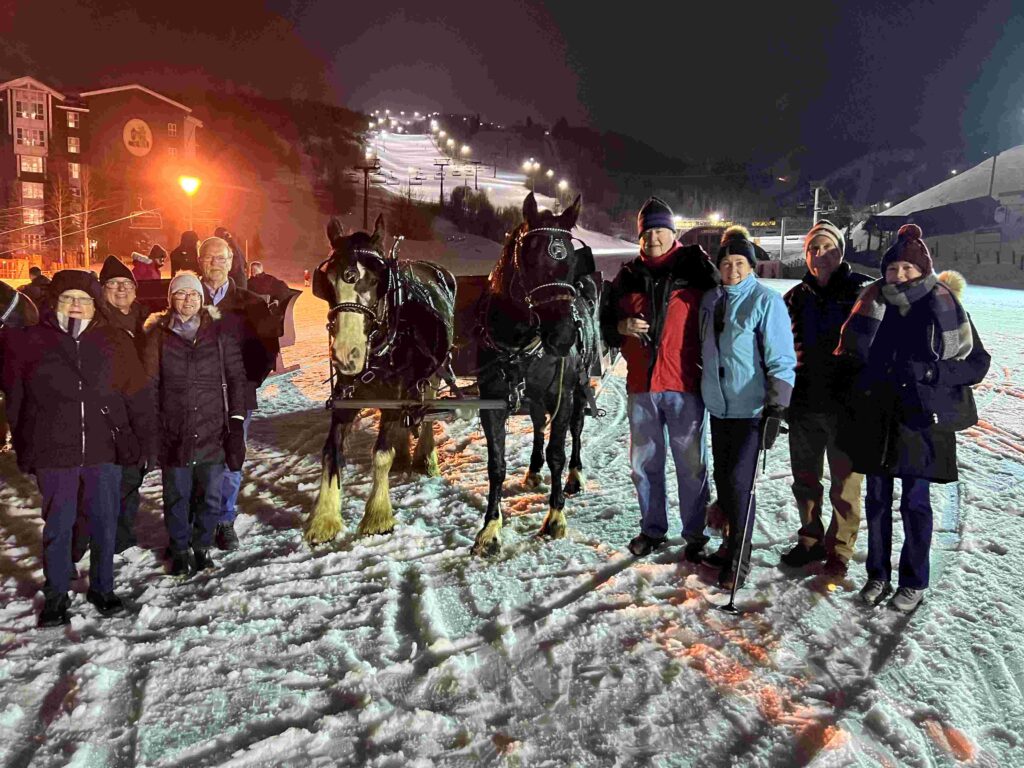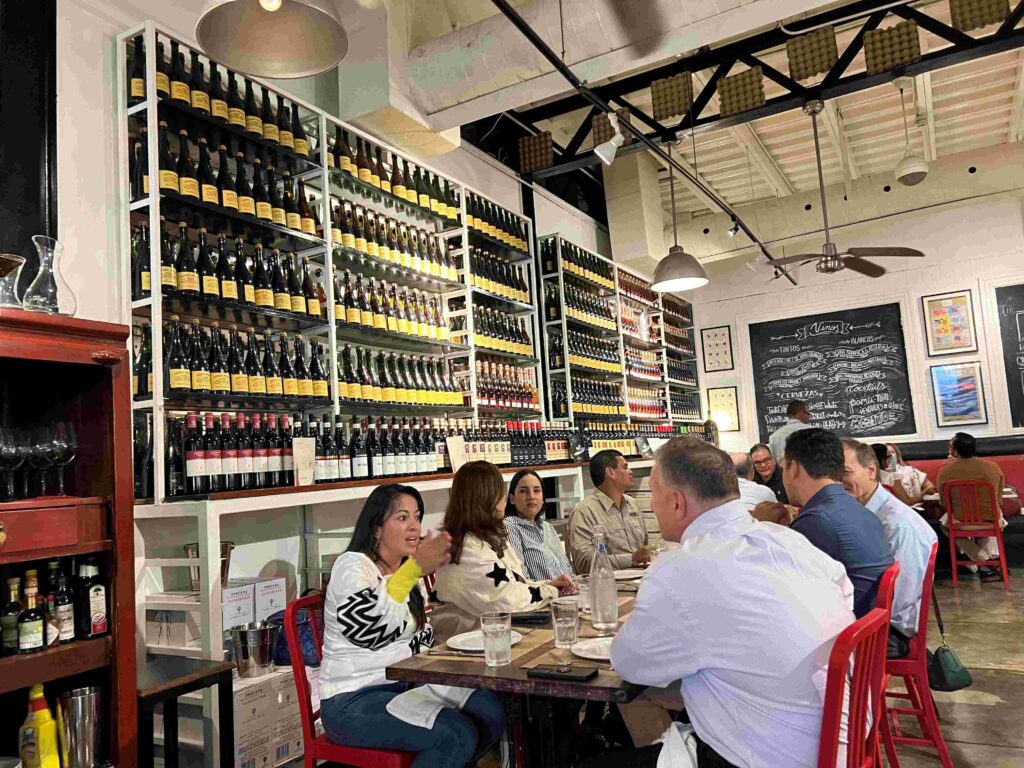Small Group Travel Planning: The Do’s and Don’ts

Small Group Travel Planning can be stressful, especially when it comes to coordinating with multiple people. In this blog post, we’ll cover the do’s and don’ts of small group travel planning, from communication tips to budgeting strategies and everything in between.
Small Group Travel Planning: Mistakes We Have Made
In travelling with a small group, families or friends, Small Group Travel Planning is critical. Robin and I recently just completed three group couples’ trips. The first group travel trip was with eight of us on a European River Cruise. Next, was a trip with fourteen of us in Key West, Florida. Last, was a trip with eight of us on a ski trip to Park City, Utah. Honestly, I am not sure we did a great job of travel planning on any of the trips. We did get better on the final trip, but there were still some improvements we could do there.
Here are some of the problems we encountered:
- European River Cruise: The person who originated the European River Cruise rescheduled the trip after his original trip was cancelled because of the Covid pandemic. Because of the change, when he communicated the new dates to the rest of the group, there was a mistake in communication and the other three couples ended up booking the cruise on a different day.
- Key West Group of Fourteen Trip: It was clear that a group of that size is almost impossible to plan. It was difficult to get anyone to take the lead and organize the events. Therefore, an insufficient number of activities were planned, despite best efforts of one of the lead planner.
- Park City Ski Trip: The group of eight stayed at our four bedroom timeshare. There were fewer planning issues as there was a host who knew many of the activities to do in the area. However, the two problems developed around coordinating meals. The first involved the arrival of everyone since all came in on different flights. Arranging a welcoming meal was difficult. The second challenge involved not having a vegan option available for one of the group at one of the dinner events.
Complexities of Small Group Travel Planning Among Friends
Small Group Travel planning can indeed be a complex endeavor, especially when coordinating arrangements for multiple individuals. Coordinating group trips with friends involves many different factors than with large group corporate travel planning. Here are the intricacies, sensitivities and challenges associated with organizing small group trips:
- Gathering Input From All Participants: Unlike solo, individual couples or even large corporate travel planning, small group travel planning among friends or relatives requires serious consideration to the individual desires of each participant to ensure there is something for everyone.
- Securing Group Bookings in Advance: When booking for a group, it’s crucial to secure reservations well ahead of time. Coordinating travel logistics becomes more manageable when everyone is synchronized.
- Cost Considerations:. It is important to plan activities that are suitable to the budgets of all participants. Destination weddings and other family/friend gatherings can be particularly challenging when participants come from different economic backgrounds.
- Coordinating Arrivals from Different Destinations: Coordinating arrivals from various locations can be a challenge. Ensuring that everyone arrives at the right place and time requires meticulous coordination and planning.
- Establishing Roles and Responsibilities: Small group travel planning works best when it is clear that there is an overall travel coordinator and everyone on the trip has a defined role which they clearly understand. An overall travel itinerary should be maintained. However, the coordinator should not be expected to do all the planning. There is a delicate balance between making all the decisions versus leaving some gaps for input from others.
Cos’s Guide4Travel 6-Step Planning Process
In our Primary Travel Planning Post we laid out a 6-step-planning process. This process will result in organizing a well thought out travel plan. Please review that post for details or just review it below:
Cos’s 6-Step Planning Process:
- Step One: The Trip Planning “W” Questions:
- Question One – Why do I want to travel?
- Question Two -Where Do I want to go?
- Question Three – What are my transportation and lodging options?
- Question Four – What do I want to do on the trip?
- Questions Five and Six – When do I want to go and what will the weather be like?
- Step Two: How much do we spend?
- Step Three: Plan the Details
- Step Four: Actions in Advance of Travel
- Step Five: Packing
- Step Six: Meals & Activities
Planning Small Group Travel
The 6-step planning process must be modified for group travel. First, is deciding who you should include. Okay, this can be controversial. But, there are multiple reasons why you will need to do this by involving the core group of people who are going to be planning the trip.
Not everybody in the group may not want to do the same things. On a beach trip some people may want to go to the beach, other people may want to stay at the pool, and still others may want some adventure, fishing, scuba diving or other activity. That is fine. Everybody doesn’t need to do the same thing. But they do need to agree to be in the same place, and likely be willing to eat at the same places.
Therefore, you don’t need to take a Mr. No on the trip who says no to everything. And you need to make sure that the people who are included can all go at the same time. Also, when you have a group it can be a challenge when one or more people are always late to meet for an activity. It might be best to not-invite people who will be making everyone else wait for them.
Lastly, it is important that someone is designated as the travel coordinator or central planner. It is important for that person to be open to everyone’s thoughts and suggestions and not make all the planning decisions. Nevertheless, it is important to have a coordinator with strong negotiation skills who can put together and communicate an overall travel plan so everyone is happy.
Changes to the Step One – The Initial Trip Planning “W” Questions
Initially, getting agreement on “the why” and “the where” are the first things that are important. If some people in the group want to go visit an island and others want to visit museums in a city, you may have a problem. Perhaps you need to break the group up, or seek a compromise, but you cannot just force one option over the other. The most important issue in any group trip is to let everyone participate in the decision making process. For more information on travel destination options, please see our Destinations Page.
In addressing this initial issue, it is also best to get everyone to agree to and understand the overall goal of the trip. Goals can be general, such as to relax or experience something new. Or, maybe, in the case of multigenerational travel, your vacation is to foster strong bonds between family members. A more rigorous, detailed itinerary may not be received well if many of the travel companions are expecting a relaxing trip and are greeted with a detailed list of activities.
Once you decide on the general reason you want to travel, the next step is to decide where and when. Here, compromise is possible. If some people want to go to Paris in March and others want to go to London in May, perhaps there is a compromise: do both in April.
When are you traveling? This seemingly easy early step in planning a group trip can quickly turn into a nightmare. Everyone will inevitably have something they “can’t miss” over some of the suggested dates. It is best to define all the possible date options for your group vacation and let the group select their preferences using some form of multi-variant voting or other input. Whichever date works best for the majority, lock it in! No more need for diplomacy or awkward conversations from the group trip planner.
Changes to the Step One – The More Detailed Trip Planning “W” Questions
Now you have to deal with the transportation and lodging options. It is important that everyone in the group can get to the destination(s) without unreasonable travel. If people need to make three or four complex connections to get to the destination(s) then perhaps this is not a great choice. This probably won’t happen if you are deciding to go major cities such as Paris or London. But, it may be a problem if you plan on going to some isolated place like a fishing camp in Alaska, or an island in the middle of the Indian Ocean.
Another big step is to create a thorough and enticing group itinerary. You’ll need to put some thought into which days are most convenient for your group to arrive and depart from your chosen destination. Please see our Travel Planning Tools Post for more information.
Finally, you need to get agreement on what you want to do on the trip. Don’t plan to visit a museum every day if the majority of the group is not interested in museums. You won’t get everyone to agree on everything, but getting input from everyone is important and finding compromise is critical. You don’t need to book the actual activities at this point of the planning process. Just make sure you get general agreement as to the kinds of things people would like to do and that those kinds of activities are available where you are going.
Changes to Step Two – How Much Do We Spend
While a budget is important for every trip, it is critical for Small Group Travel. Having a clear idea of what your group can comfortably afford goes a long way to prioritizing activities and accommodations. Try to have each person pay individually for as many of these items as possible. Shared meals can be a challenge if everyone is paying the same, but each person is eating very different items.
The most common group vacation expenses include these items:
- Lodging and accommodations
- Transportation to the destination
- Transportation within the destination
- Foods and drinks such as meals, snacks, and eating as vacation activity
- Entrance fees or tickets to activities, events, or sites
- Potential emergencies or need for medical care
- Travel insurance
Step Three Changes – Plan the Details
Transportation and lodging can be complicated, especially if the people in the group are coming from different locations and have different budgetary requirements. We recently did a group trip to Amsterdam and the people wanted to stay in different hotels because they wanted to use points at different hotels. This shouldn’t be a showstopper but it needs to be considered in planning activities and dinners as people will be coming from different locations or arriving at different times.



There are a couple of points during your group trip that you’ll need to think about regarding transportation:
- What will it cost each person to get to the destination?
- How are each person get to and from the airport at your destination?
- How will the group do to get around at your destination?
Planning for a shared house can be a particular challenge. We like VBRO to help find homes that groups can share.
Airport Transportation
Airport transportation is best coordinated beforehand, including arrival and departure times. Will you rent cars vs. taking an Uber/Lyft from/to the airport as a group? However, not all destinations have Uber/Lyft available so you’ll want to know what a taxi, private car or shuttle might cost. Ideally, you can also book a shuttle through your hotel which is great for groups.
Step Four Actions in Advance of Travel
Decisions to use a travel agent and to book travel tours can be more complicated when a group is involved in the decision process. If some of the group wants to use a travel agent and others don’t that should not be a problem. However, it will involve more coordination.
Deciding on travel tours can be more complicated since it is likely that people in the group will have different ideas about what tours they would like to do. Please see our Post on Small Group Travel Tours.
Probably best if one person doesn’t have the responsibility to plan all the tours and most importantly to pay for all the tours, only to “settle up” at the end of the trip. Our recommendation is to have various people in the group plan different locations or different days. It is very important that there is open communication. If someone in the group doesn’t want to do a specific tour, it is best not to schedule it unless they say it is fine because they could do something else on their own.
It is also important that everyone takes care of things at home before they leave on the trip. Please check out our House Care Post and our Insurance/Passport Post, or just make sure you have addressed the following items.
Here are a few essential items to consider before a group trip:
- Arrange a pet sitter/kennel stay for your pets.
- Look into visa requirements at your destination.
- Get any necessary or suggested vaccinations before traveling to certain countries
- Think about anything that might need to be done at your home while you’re away (plant sitter, etc.)
- Are everyone’s passports up-to-date with at least 2 blank pages?
- Purchase travel insurance
- Notify your bank/credit card company of your travel plans
- Unplug electronics in your home
- Clean out anything that may spoil from your fridge
- Turn off water input if possible
- Put a hold on your mail delivery
- Look into an international plan for your cell phone
Step Five Changes – Packing
If one party in the group is familiar with any specific packing needs, they need to share that information with the group. For example, if you are going to a ski place that has an outdoor heated pool, it is important to share that information with the group. Since most people probably aren’t thinking they need a bathing suit.
Step Six Changes — Meals & Activities
We already discussed the coordination that is needed when planning group travel tours. The same issues apply in planning all other activities even if they do not need to be planned in advance. If you don’t plan activities there is a sense that the trip will not be as eventful as everyone expects. Examples of common group activities are:

- Museums
- Iconic sites and natural wonders
- Beaches
- Shopping
- Sporting events
- Tours by land and sea
- Spas
- Hiking
- Boating or fishing
- Adult gaming
- Unique eating experiences such as themed restaurants
- Escape rooms
- Plays or concerts

Planning meals can be a big headache. If members of the group have specific dietary requirements, than that must be considered in planning the meals. Also, the biggest issue is when the check comes, and they only present a single bill. It is best to have the waiter provide individual checks. Make sure you let them know that you want individual checks at the beginning of the meal.
Summary
In summary, small group travel planning involves juggling multiple variables, from transportation and accommodation to individual preferences and unforeseen circumstances. By staying organized, anticipating challenges, and leveraging available tools, you can navigate these complexities successfully and ensure a smooth team travel experience.
Call to Action
I am sure that we have not mentioned everything that is needed to organize a well-planned out small group travel event. If you can think of other items that we should include, please leave a comment and we will be most appreciative.


